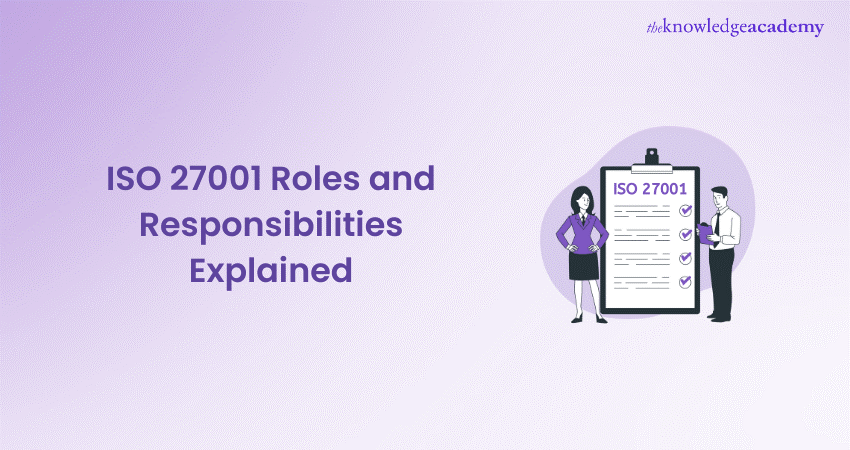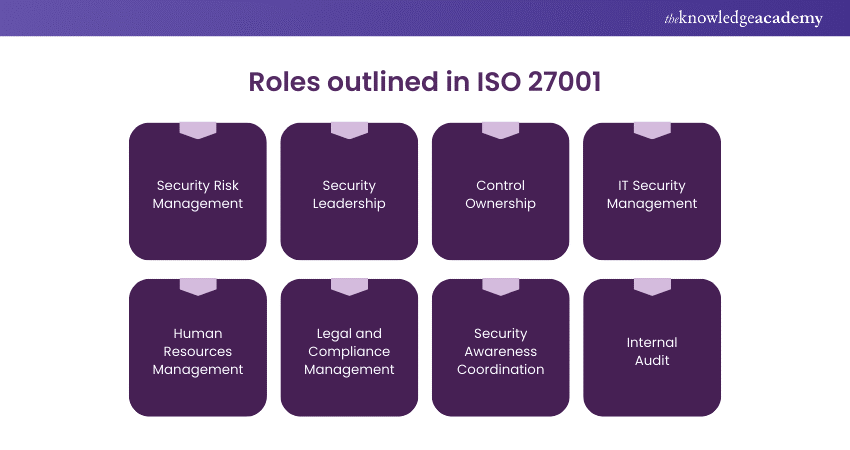We may not have the course you’re looking for. If you enquire or give us a call on +61 272026926 and speak to our training experts, we may still be able to help with your training requirements.
Training Outcomes Within Your Budget!
We ensure quality, budget-alignment, and timely delivery by our expert instructors.

With 70% of worldwide internet users (as per Statista) falling prey to cybercrime in 2022, maintaining high-level Cybersecurity measures is paramount for organisations across industries. In light of this, ISO 27001 Roles and Responsibilities act as the cornerstone of a robust Information Security Management System (ISMS). But what exactly entails these roles, and how do they fortify an organisation’s security posture?
In this blog, we will dissect the ISO 27001 Roles and Responsibilities to demystify the duties and expectations associated with each position. Additionally, understanding these roles is not just a requirement; instead, it is a strategic advantage in the battle against cyber threats. So, let’s dive into comprehending what ISO 27001 entails and why it matters.
Table of Contents
1) What is ISO 27001?
2) What does ISO 27001 require?
3) ISO 27001 Roles and Responsibilities
a) Security Risk Management
b) Security Leadership
c) Control Ownership
d) IT Security Management
e) Human Resources Management
f) Legal and Compliance Management
g) Security Awareness Coordination
h) Internal Audit
4) Conclusion
What is ISO 27001?
ISO 27001, being a global requirement, defines the basic principles for creating, documenting, operating, and improving an Information Security Management System. This standard aids organisations to establish information system processes that help them protect their information assets. It also ensures that the systems provide Confidentiality, Integrity, and Availability (CIA).
What does ISO 27001 require?
When implementing ISO 27001, organisations must employ a risk management strategy, that aid in recognising and evaluating the risks of their information assets, and applying controls aimed at reducing those risks. The standard here reiterates the role of top management focus, sustainability of rules, and adherence to legal and regulatory requirements.
ISO 27001 Roles and Responsibilities
Among the duties in implementing ISO 27001, organisations have to disburse particular positions and responsibilities to important supervisors in order to get their Information Security Management Systems off the ground. Let's explore the essential roles and responsibilities outlined in ISO 27001:

1) Security Risk Management
Security Risk Managers are of primary importance in ISO 27001. They cover identifying, assessing, and addressing risks on organisation's information assets, including information systems, network, data, digital security and web services. Their key responsibilities involve risk assessment, risk crisis plan development, and control effectiveness tracking.
2) Security Leadership
Security leadership occupies a critical position in driving the force behind an organisation's information security initiatives. This role often involves characterising information security, which constitutes the development of policy and objectives, and providing resources in order to implement security measures.
Empower your team with our ISO 27001 Foundation Training - join us now!
3) Control Ownership
The Control Owners are responsible for implementing and maintaining particular security controls within the organisation. They oversee the implementation of controls. In addition, such experts ensure compliance with relevant procedures and policies to monitor the effectiveness of controls in mitigating risks.
4) IT Security Management
IT Manager or Security Officer oversees all IT security operations for the organisation's IT platform and its systems. Their activities focus on the implementation of measures like controlling, cyberattacks tracking, and responding to security breaches or incidents in an optimal way.
5) Human Resources Management
Human Resources (HR) Managers make certain that all employees know their obligations regarding information security. HR are responsible for distribution of security awareness training sessions, enforcement of the security policy, and managing access to the sensitive information of employees.
6) Legal and Compliance Management
The Legal and Compliance Officer ensures that the organisation complies with Information Security-related regulations, laws, and industry standards. This includes conducting legal reviews, addressing compliance issues, and liaising with regulatory bodies as necessary.
Elevate your Cybersecurity expertise with our ISO 27001 Lead Auditor Training!
7) Security Awareness Coordination
The Security Awareness Coordinator is tasked with promoting a security awareness-culture within the organisation. This role involves developing and delivering security awareness training courses, communicating security policies and procedures to employees, and monitoring compliance with security requirements.
8) Internal Audit
Internal Audits are vital in evaluating the effectiveness of the organisation's information security controls and processes. Internal auditors assess compliance with ISO 27001 requirements, identify areas for improvement, and provide recommendations for enhancing the ISMS.
Conclusion
ISO 27001 Roles and Responsibilities are effective in the maintenance and implementation of an Information Security Management System. By understanding its essential outlined role, organisations can achieve compliance with international standards and strengthen their security posture. We hope that this blog helped you understand the essential roles associated with ISO 27001.
Transform your career with our ISO 27001 Internal Auditor Training - book your spot now!
Frequently Asked Questions

ISO 27001 comprises 14 domains, each addressing specific aspects of Information Security Management Systems. These domains include risk assessment and treatment, access control, cryptography, physical and environmental security, and incident management, among others.

ISO 27001 Information Security safeguards the Confidentiality, Integrity, and Availability of organisational information assets. By doing so, it ensures that sensitive information is only accessed by authorised individuals or entities.

The Knowledge Academy takes global learning to new heights, offering over 30,000 online courses across 490+ locations in 220 countries. This expansive reach ensures accessibility and convenience for learners worldwide.
Alongside our diverse Online Course Catalogue, encompassing 17 major categories, we go the extra mile by providing a plethora of free educational Online Resources like News updates, Blogs, videos, webinars, and interview questions. Tailoring learning experiences further, professionals can maximise value with customisable Course Bundles of TKA.

The Knowledge Academy’s Knowledge Pass, a prepaid voucher, adds another layer of flexibility, allowing course bookings over a 12-month period. Join us on a journey where education knows no bounds.

The Knowledge Academy offers various ISO 27001 Trainings, including the ISO 27001 Foundation Training, ISO 27001 Lead Auditor Training, and ISO 27001 Internal Auditor Training. These courses cater to different skill levels, providing comprehensive insights into Information Security Management.
Our IT Security & Data Protection Blogs cover a range of topics related to ISO 27001, offering valuable resources, best practices, and industry insights. Whether you are a beginner or looking to advance your Information Security skills, The Knowledge Academy's diverse courses and informative blogs have got you covered.
Upcoming IT Security & Data Protection Resources Batches & Dates
Date
 ISO 27001 Foundation
ISO 27001 Foundation
Mon 10th Feb 2025
Mon 17th Mar 2025
Mon 12th May 2025
Mon 7th Jul 2025
Mon 1st Sep 2025
Mon 10th Nov 2025







 Top Rated Course
Top Rated Course



 If you wish to make any changes to your course, please
If you wish to make any changes to your course, please


